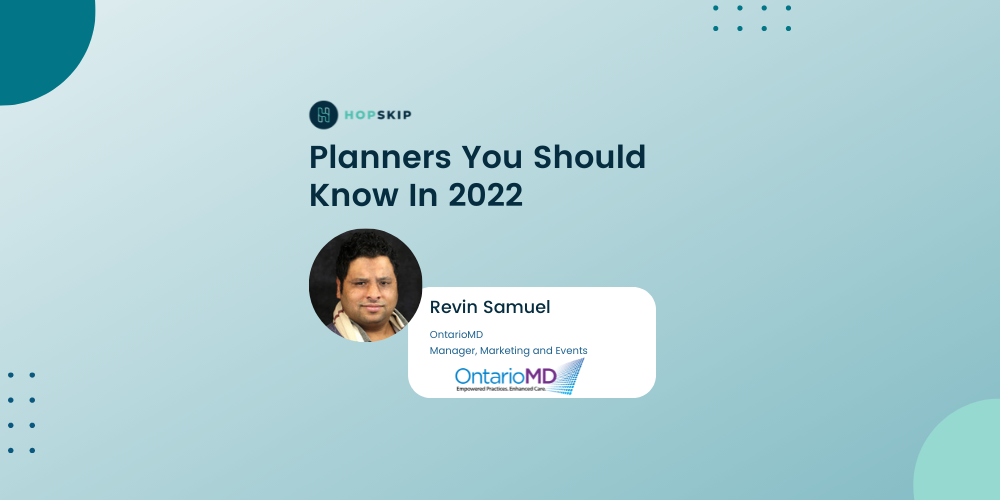This post is part of the HopSkip Planner Spotlight Series where HopSkip spotlight's planners across the industry to bring awareness of how they adapted to COVID-19, communicating and lessons learned and sharing how they are viewing the meetings and events industry in a post-pandemic world.
Name: Samuel Revin
Company Name: OntarioMD
Job Title: Manager, Marketing and Events
Years of Experience: 17
How did you get your start in the events industry? What made you pursue this role?
I was working for a boutique marketing firm that specialized and retail and sports marketing. They decided to host a networking event for their clients and perspective clients and I was tasked with running that event. From there I fell in love with event planning and all the different aspects to it from logistics, registration, innovations, sponsorship but most importantly delivering a well executed event that the attendees/participants enjoy and take value from.
How do you compare planning your first in-person event post-pandemic, to planning meetings/events pre- Covid? What was different and unique? What was similar?
We have taken our return to in-person events a little slower. We are returning to in-person events in the fall. I'd suggest the most different element is incorporating hybrid elements into the conference. It makes the conference more expensive to put on, their is greater risk incorporating the technology, and you need to focus on two different audiences with the in-person and the virtual. A lot of the similarities are from the in-person element, venue selection, registration and catering.
What was your number one challenge in hosting your first in-person event(s) and how did you overcome it?
The number one challenge will be incorporating hybrid aspects into our conference while being able to host a successful event and staying within a reasonable budget.
What is the top learning that you uncovered from the last two years that you’re implementing in your planning process today? (any other tips or tricks you want to share?)
The big thing that you want to focus on is prepping the team that supports you and having contingency plans in place. Remember that the people who are helping you execute this event, this is not their full time job or their number one priority. You need to train them, support them and ensure they have everything they need to help you run the event and this applies to any type of event whether virtual, in-person or hybrid.
With hotels short-staffed, and RFP lead time shortening, what is your advice to other planners to overcome these obstacles when requesting hotels for proposals?
Network and have established contacts that you work with. Sometimes we don't have time to do all the research that we want to do for hotels and venues, and using an organization or platform that can help source hotels/venues for you is quick and really helpful.
Are you approaching contracting with hotels differently, post-pandemic?
Hotel rates are fairly expensive as we move out of this pandemic world and people are getting out and about. There's nothing much to do differently other than to plan further in advance and work with hotels to get reasonable rates that your organization, guests and attendees can afford and are willing to pay.
What is the biggest area of improvement that you think hotels can make when either responding to your RFPs or during the contract phase of your event?
I think we just want as many details as we can get from one person. Some of the times you are dealing with multiple different contacts for sales, then catering, then AV, which is fine, but to make event planning easier, you'd like to see as many questions answered and included in the response to the RFP as possible.
Due to the pandemic, our events community had to evolve, adapt, and grow. Many planners started to embrace new technologies as a result of the pandemic. What new tech are you using today in your planning process as a result?
We are a government funded organization so we are in the position of trying to put on a successful virtual conference, but being able to manage and execute it using as many in-house resources as possible. We greatly relied on Microsoft Teams and the Live Event Broadcast feature to host our events. The technology doesn't have everything we want but it gets the job done pretty smoothly and is easy to use for the majority of attendees. We also built our own conference platform leveraging WordPress, which isn't as sexy as other conference platforms, but we were able to harness its best features and make it our greatest strengths.
Since education and relationships are two major pillars in the meetings and events industry, any suggestions on how other planners can learn and network with their peers across the industry?
There are different organizations and groups that you can join to help with that. I suggest keeping contacts and maintaining relationships with the people you meet in this industry. Everyone can help and provide advice from the person who has the most experience to the person with the least experience. Technology is always changing and events are constantly evolving so best to keep your eyes open, keep listening and keep learning from others.
This post is part of the HopSkip Planner Spotlight Series where HopSkip spotlight's planners across the industry to bring awareness of how they adapted to COVID-19, communicating and lessons learned and sharing how they are viewing the meetings and events industry in a post-pandemic world.
